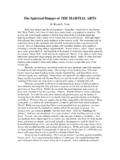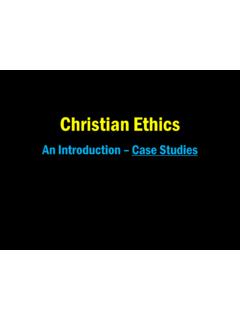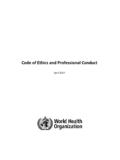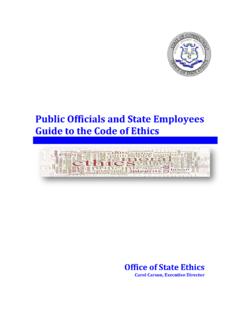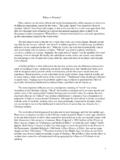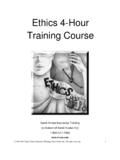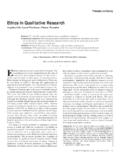Transcription of STUDIES IN CHRISTIAN ETHICS SYLLABUS
1 STUDIES in CHRISTIAN ETHICS Page 1 STUDIES IN CHRISTIAN ETHICS SYLLABUS Dr. Russell K. Tardo I: Introduction to CHRISTIAN ETHICS This study will cover CHRISTIAN behavior and conduct from all aspects, including CHRISTIAN responsibility and morality applied to daily living. Resource Materials (While not individually footnoted, all are utilized, cited and quoted, some extensively): An Introduction to CHRISTIAN ETHICS .. Charles B. Williams CHRISTIAN Personal ETHICS .. Carl Henry Basic CHRISTIAN ETHICS .. Paul Ramsey ETHICS , Alternatives & Issues .. Norman Geisler CHRISTIAN ETHICS .. White Theonomy in CHRISTIAN ETHICS .
2 Greg Bahnsen Introducing CHRISTIAN ETHICS .. Henry Barnett CHRISTIAN ETHICS , a Primer.. William Tillman Lecture Series on CHRISTIAN ETHICS .. Dr. Hobart Freeman CHRISTIAN ETHICS .. Waldo Beach, H. Richard Niebuhr The study will be divided into two sections. The first section deals with the principles of CHRISTIAN ETHICS while the second will be concerned with the practice. A. Definitions 1. The Basic Definition An ethic is defined as a set of moral principles or values; a theory or system of moral values. ETHICS are principles of conduct, , what is good, what is bad, etc. 2. The Definition from the Perspective of the CHRISTIAN a. The study of the principles and practices of right and wrong in the light of the Scriptures; b.
3 The application of Christianity to conduct; c. Translating doctrine into deeds, , the study and application of the CHRISTIAN faith. Some mistakenly use the terms ETHICS and morals interchangeably, but they are not the same. The term morals comes from the Latin meaning custom or habit. Morals are what people do. The word ETHICS is from the Greek meaning a standard or rule; a norm. In contrast to morals, ETHICS communicates the idea of what one ought to do, whereas morals are what they actually do. ETHICS is faith translated into actions. It is living according to biblical facts and principles, not just having knowledge of them.
4 STUDIES in CHRISTIAN ETHICS Page 2 B. Why study CHRISTIAN ETHICS ? 1. Because all people make moral and ethical decisions every day. 2. Because all people need the light that it throws on our daily problems and decisions. 3. Because it stimulates personal spiritual growth. ETHICS supplies the standard by which believers can measure their own spiritual growth and development. 4. Because Jesus' teaching was ethical as well as theological. 5. Because every decision is made according to some ethic, , some standard or norm. In those days there was no king in Israel, but every man did that which was right in his own eyes.
5 [Judges 17:6] This, unfortunately, is the standard of ETHICS for many today. C. Two-fold Standard of Conduct or Model 1. Jesus, , His example, His life. Jesus saith unto him, I am the way, the truth, and the life: no man cometh unto the Father, but by me. [John 14:6] 2. The Word of God. All scripture is given by inspiration of God, and is profitable for doctrine, for reproof, for correction, for instruction in righteousness: That the man of God may be perfect, thoroughly furnished unto all good works. [2 Tim. 3:16-17] D. Several Presuppositions to be kept in mind during the course of this Study 1. CHRISTIAN ETHICS is grounded or based on the ETHICS of the Old Testament, its Jewish heritage.
6 The presupposition ETHICS of the Old Testament fulfilled themselves in the New Testament. The New Testament does not stand by itself, but it's a fulfillment of the Old Testament. Think not that I am come to destroy the law, or the prophets: I am not come to destroy, but to fulfill. [Mat. 5:17] 2. There is a vast difference between CHRISTIAN ETHICS and all other ethical systems. For example, philosophical ETHICS are the ETHICS of the world and they are based on such things as duty, pleasure, law, science, etc., whereas CHRISTIAN ETHICS are based on right and wrong in the light of the scriptures. Philosophy raises all the same questions as theology but the conclusions drawn from philosophy are all wrong.
7 Philosophical ETHICS tries to answer all questions based on man's fallen intellect. Their ETHICS is therefore inadequate and incomplete. No philosophy or religion can provide the correct answers except Christianity. The problem with philosophical ETHICS is that the reasons and concepts of fallen man are made to be the standard. They base their knowledge and pursuit of truth on man's reason. The CHRISTIAN bases his on the divine revelation of God's Word and the person of Jesus. This is the man who possesses truth. But the natural man receiveth not the things of the spirit of God; for they are foolishness unto him: neither can he know them, because they are spiritually discerned.
8 [1 Cor. 2:14] This I say therefore, and testify in the Lord, that ye henceforth walk not as other Gentiles walk, in the vanity of their minds. [Eph. 4:17] STUDIES in CHRISTIAN ETHICS Page 3 Every man is brutish in his knowledge: every founder is confounded by the graven image: for his molten image is falsehood, and there is no breath in them. They are vanity, and the work of errors: in the time of their visitation they shall perish. [Jer. 10:14-15] The fool hath said in his heart, There is no God. They are corrupt, they have done abominable works, there is none that doeth good. The Lord looked down from heaven upon the children of men, to see if there were any that did understand, and seek God.
9 They are all gone aside, they are all together become filthy; there is none that doeth good, no, not one. Have all the workers of iniquity no knowledge? who eat up my people as they eat bread, and call not upon the Lord. [Ps. 14:1- 4] 3. CHRISTIAN ETHICS are based on the CHRISTIAN religion and because of this, demands moral and ethical behavior. Not every religion, however, demands such behavior. For example, the religions of the ancient Philistines and Canaanites were very immoral with such practices as temple prostitution and child sacrifices. This lack of moral and ethical behavior in religion is still prevalent in India and other Hindu and Buddhist countries today.
10 Because of their belief in reincarnation and Karma, they have no pity or sympathy for the afflicted, , the blind, cripples, retarded, etc. They feel it is their just desert for bad deeds in a previous life. The CHRISTIAN religion, on the other hand, requires certain moral and ethical behavior. However, some professing CHRISTIAN groups and individuals have abandoned their Judeo- CHRISTIAN moral and ethical heritage, and now promote pro-abortion positions, homosexual clergy, gambling (bingos, raffles, etc.) drinking, etc. in their church sponsored activities and think there is nothing wrong with it. For the genuine CHRISTIAN , however, his religion affects every aspect of his life.

